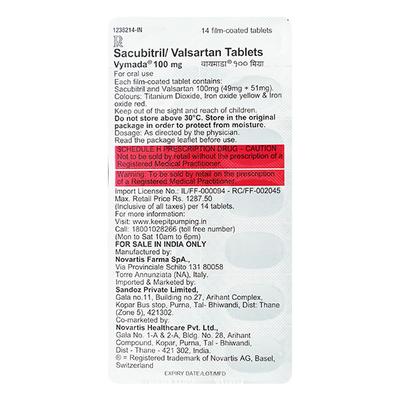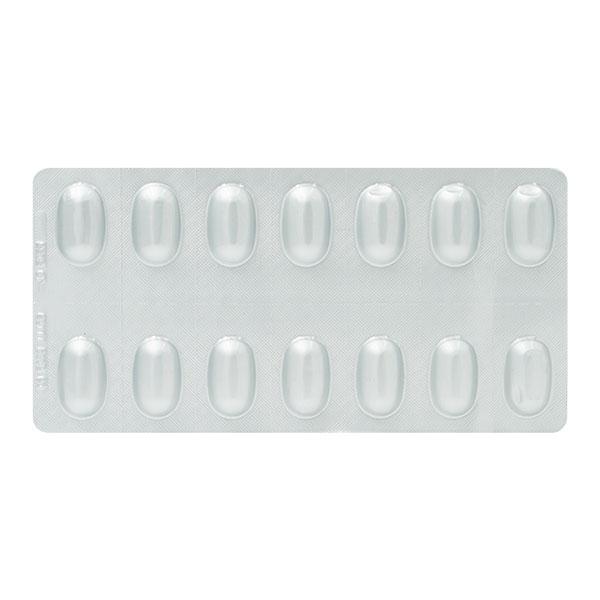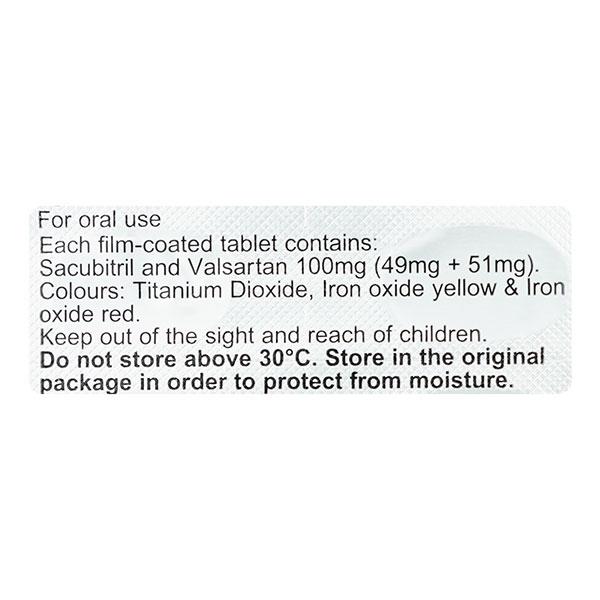

Netmeds First Membership
Quick Links
Introduction About VYMADA 100MG TABLET
Vymada Tablet is indicated to reduce the risk of cardiovascular death and hospitalization for heart failure in patients with chronic heart failure (New York Heart Association Class II-IV) and reduced ejection fraction.
It contains a combination of medicines called Sacubitril and Valsartan, which belong to the group of medicines called Angiotensin II receptor blockers and Neprilysin inhibitors. It helps relax blood vessels, lower blood pressure, and improve heart function by reducing the strain on the heart.
Heart failure occurs when the heart is weak and cannot pump enough blood to the lungs and to the rest of the body, and it is characterized by symptoms such as breathlessness, fatigue, tiredness, and ankle swelling.
Before taking Vymada Tablet, inform your doctor if you have liver, kidney, or heart problems. It is not recommended for use in pregnant and breast-feeding women. This medicine is not suitable for use in children and adolescents under 18 years of age, and it should be used with caution in elderly patients (65 years of age and above).
Before taking Vymada Tablet, inform your doctor about previous allergies and medication history to manage any serious effects. The most common side effects of taking this medicine are dizziness, cough, headache, tiredness, nausea, and weakness. Consult your doctor if any of the side effects worsen.
Uses Of VYMADA 100MG TABLET
How VYMADA 100MG TABLET Works
Vymada helps to manage long-term heart failure, where sacubitril works by relaxing and widening the blood vessels and makes it easier for the heart to pump blood throughout the body, and valsartan works by relaxing the blood vessels by blocking a substance called angiotensin-II (causing blood vessels to tighten), which is produced in the body and thus lowers the blood pressure.
How to use VYMADA 100MG TABLET
- Take Vymada as advised by your physician.
- Swallow Vymada with a glass of water. Do not crush or chew the medicine.
- Your doctor will decide the correct dose and duration for you depending upon your age, body weight, and disease condition.
Side Effects Of VYMADA 100MG TABLET
- Dizziness, lightheadedness (low blood pressure)
- Signs of high levels of potassium in the blood (irregular heartbeat, muscle weakness)
- Decrease in renal function
- Cough
- Diarrhoea
- Signs of low red blood cells (anemia)
- Tiredness, weakness
- Headache
- Fainting or spinning sensation
- Nausea
- Inflammation of the lining of the stomach (stomach pain, nausea)
- Signs of low sugar levels in the blood (fast heartbeat, sweating, nervousness, or anxiety)
Stop taking Vymada Tablet and contact your doctor immediately if you experience any of the following side effects:
- Severe allergic reactions (swelling of the face, lips, tongue, or throat, which may cause difficulties in breathing or swallowing (angioedema))
Warning & Precautions
Pregnancy
ContraindicatedVymada Tablet is not recommended for use in early pregnancy and must not be used in pregnant women when more than 3 months pregnant, as it may cause serious harm to the baby.
Breastfeeding
ContraindicatedVymada Tablet is not recommended for use in breastfeeding women.
Driving and Using Machines
Use with CautionAvoid driving or handling any machines while taking the Vymada Tablet because it may cause dizziness or tiredness.
Kidney
Use with CautionVymada Tablet should be used with caution in patients with severe kidney disease and with narrowed kidney arteries.
Liver
Consult your doctorVymada Tablet is not recommended for use in patients with severe liver disease, and it should be used with caution in patients with liver disease.
Allergy
ContraindicatedDo not take Vymada Tablet if you are allergic (hypersensitive) to Sacubitril and Valsartan.
Use In Pediatrics
ContraindicatedVymada Tablet is generally not recommended for use in children and adolescents (under 18 years of age).
Use In Geriatrics
Use with CautionVymada Tablet should be used with caution in elderly patients (above 65 years of age).
Others
Vymada Tablet is not recommended for use if you have:
- Diabetes or impaired kidney function (and being managed with aliskiren (blood pressure lowering medicine))
- Personal or family history of angioedema (when taking angiotensin receptor blockers (ARB) such as valsartan, telmisartan)
Before taking Vymada 100 Tablet, inform your doctor if you have:
- History of angioedema
- Low blood pressure
- Vomiting or diarrhea
- Dehydration
- Hallucinations, paranoia, or changes in sleeping pattern
Interactions
A. Drug-Drug interactions:
Before taking Vymada 100 Tablet, inform your doctor if you are taking any of these medicines:
- Enalapril, lisinopril, or ramipril (manages high blood pressure)
- Aliskiren and angiotensin receptor blockers such as telmisartan and losartan (manages heart failure)
- Atorvastatin (lower high cholesterol levels)
- Sildenafil (manages erectile dysfunction or lung hypertension)
- Potassium supplements, salt substitutes containing potassium, potassium-sparing medicines such as spironolactone (used to increase potassium levels in blood)
- Heparin, warfarin (manages blood clots)
- Non-steroidal anti-inflammatory medicines (NSAIDs) such as ibuprofen, indomethacin, or selective cyclooxygenase-2 (Cox-2) inhibitors such as celecoxib (manages pain and inflammation)
- Lithium (used to manage psychiatric illness)
- Furosemide (used to increase the amount of urine)
- Nitroglycerine (manages angina pectoris)
- Rifamycin (manages bacterial infections)
- Ciclosporin (used to manage rejection of transplanted organs)
- Ritonavir (used to manage HIV/AIDS)
- Metformin (manages diabetes)
Overdosage:
If you or anyone else accidentally takes too much of Vymada 100 Tablet, contact your doctor immediately or go to the nearest hospital straight away. Overdosage symptoms of Vymada 100 Tablet include severe dizziness and fainting.
Synopsis
| Drug | : | Sacubitril and Valsartan |
| Pharmacological Category | : | Neprilysin Inhibitor, Angiotensin II Receptor Blocker |
| Therapeutic Indication | : | Heart failure |
| Dosage Forms | : | Tablet |
More Information
FAQs About VYMADA 100MG TABLET
Q: What is Vymada 100 used for?
A: Vymada 100 is used to manage chronic heart failure in patients with a reduced ejection fraction (HFrEF), specifically New York Heart Association (NYHA) Class II-IV. It helps reduce the risk of cardiovascular death and hospitalization caused by heart failure. Vymada works by improving the heart's efficiency and reducing the strain on the heart, helping to manage symptoms such as fatigue, breathlessness, and fluid retention.
Q: What is the function of Vymada?
A: Vymada combines two medications, Sacubitril and Valsartan, which work together to relax blood vessels by reducing resistance and allows blood to flow more easily, lowering blood pressure which helps in the management of hypertension and reducing the strain on the heart. It also improves heart function where sacubitril helps in removal of excess sodium and water, while Valsartan blocks angiotensin II, reducing vasoconstriction and preventing heart strain. Together, they enhance heart efficiency and improve quality of life in heart failure patients.
Q: What are the side effects of Vymada for kidneys?
A: Vymada may cause reduced kidney function in some patients. Potential side effects includes increased creatinine levels, electrolyte imbalances like high potassium levels (hyperkalemia), Dizziness, fatigue, swelling, or reduced urine output.
Q: What happens when you stop taking Vymada?
A: Stopping Vymada abruptly can worsen heart failure symptoms, such as breathlessness, fluid retention, and fatigue. The heart may work less efficiently, increasing the risk of complications. Always consult your doctor before stopping or adjusting the dosage of Vymada, as a gradual change might be necessary to avoid complications.
Q: How effective is Vymada?
A: Vymada is highly effective in managing chronic heart failure. Clinical trials, such as the PARADIGM-HF study, have shown that Vymada significantly reduces cardiovascular death risk, hospitalization rates for heart failure and symptoms of heart failure, such as fatigue and shortness of breath. It improves overall quality of life by enhancing heart function and managing fluid retention.
Q: Can valsartan damage kidneys?
A: Valsartan, a component of Vymada, may potentially affect kidney function, particularly in patients with pre-existing kidney disease or dehydration. Therefore, patients with pre-existing kidney condition must be closely monitored.
Q: What are the indications for Vymada?
A: Vymada is indicated for heart failure with reduced ejection fraction especially in patients requiring better management than conventional therapies. It is specifically designed for patients who need comprehensive management of heart function and fluid balance.
Q: When is the best time to take sacubitril valsartan?
A: Sacubitril-Valsartan (Vymada) can be taken once or twice daily as prescribed by your doctor. While it can be taken with or without food, consistent timing helps maintain stable drug levels in your body. Consult your doctor about the optimal schedule based on your condition.
Q: Should I drink a lot of water with valsartan?
A: It’s important to maintain adequate hydration, but excessive water intake should be avoided, especially if your doctor has recommended fluid restrictions due to heart failure or kidney issues. Follow your doctor’s advice regarding water consumption to avoid exacerbating fluid retention or electrolyte imbalances.
Q: Does Vymada increase blood sugar?
A: Vymada is generally not associated with significant increases in blood sugar levels. However, in some patients, particularly those with diabetes, blood sugar levels may fluctuate. Regular monitoring of blood glucose is advised for diabetic patients while on Vymada.
Q: When is the best time of day to take valsartan?
A: Valsartan, a component of Vymada, can be taken at any time of day, but it is most effective when taken at the same time daily. Your doctor may recommend a specific time based on your routine, but consistency is key for optimal blood pressure and heart failure management.
Q: What is the benefit of Vymada 100mg?
A: Vymada 100mg helps manage chronic heart failure by improving heart efficiency, reducing symptoms like breathlessness and fatigue and lowering the risk of hospitalization and cardiovascular-related death. Its dual action on blood pressure and heart failure symptoms makes it an effective and comprehensive therapy.
Q: Does Vymada lower blood pressure?
A: Yes, Vymada lowers blood pressure by relaxing and dilating blood vessels, which decreases the workload on the heart. This helps reduce symptoms and prevents complications in heart failure patients.
Q: What is another name for Vymada?
A: Vymada is the brand name for the combination drug Sacubitril and Valsartan. In other regions, it may also be sold under the brand name Entresto.
Q: What is the most common adverse effect of Sacubitril valsartan?
A: The most common side effects include dizziness and lightheadedness due to lowered blood pressure, hypotension (low blood pressure), hyperkalemia (high potassium levels), which can cause fatigue and irregular heartbeat. Consult your doctor if you experience any of these symptoms for proper management.Bottom of Form
Q: Is valsartan good for your heart?
A: Yes, Valsartan is highly beneficial for the heart. It blocks the action of angiotensin II, a hormone that narrows blood vessels, leading to reduced blood pressure, decreased heart strain and improved outcomes in patients with heart failure and hypertension.
References
1. KD Tripathi. Cardiovascular drugs. Essentials of Medical Pharmacology. Seventh Edition. New Delhi, May 2013. Page-508.
2. Loretta Fala. Entresto (Sacubitril/Valsartan): First-in-Class Angiotensin Receptor Neprilysin Inhibitor FDA Approved for Patients with Heart Failure. NCBI; PMC. Pubmed Central. National Library of Medicine, National Institute of Health. September 2018. [Accessed on 9th October 2024] click here
3. Peter Khalil, Ghazal Kabbach, Sarmad Said, and Debabrata Mukherje. Entresto, a New Panacea for Heart Failure. NIH National Library of Medicine, National Center for Biotechnology Information. Pubmed.gov. 2018. [Accessed on 9th October 2024] click here
4. Novartis Pharmaceuticals UK Ltd. Electronic Medicines Compendium (EMC) [Revised in May 2021] [Accessed on 9th October 2024] click here
5. Cipla Ltd. Arnicor Tablets (Sacubitril/Valsartan). Ciplamed. [Revised in July 2024] [Accessed on 9th October 2024] click here










